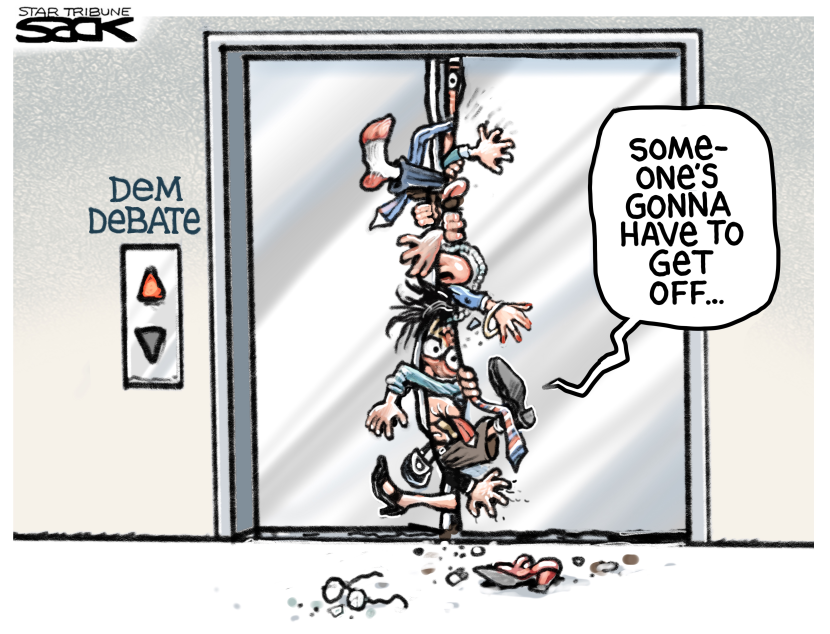
Subscribers Only Content
High resolution image downloads are available to subscribers only.
Not a subscriber? Try one of the following options:
OUR SERVICES PAY-PER-USE LICENSINGFREE TRIAL
Get A Free 30 Day Trial.
No Obligation. No Automatic Rebilling. No Risk.
In every election campaign, there comes a point when cruel reality intrudes, forcing candidate and staff to confront the growing likelihood that victory is out of reach and further expenditure of time, money and dedication to a cause is futile.
For more than 20 candidates remaining in the race for the Democratic presidential nomination, that moment has arrived.
It is a personally wrenching decision, a public acknowledgement that one’s beliefs and principles have failed to create a deep impression on the public mind and support has diminished to an unsustainable level.
For those Democrats who have consistently failed to exceed three per cent in the Real Clear Politics polling average – national as well as in individual states – continuing their quest is a willing suspension of disbelief.
Using the RCP three percent average as the benchmark measurement to remain in the race, 17 announced candidates would fail to make the cut.While nine candidates have already qualified for the next debate in September, four have failed to break three percent.
Of the remainder, several – including sitting governors, and ex-Congress members – have failed to achieve greater than one percent.Even four of the candidates whom have qualified for the debate have consistently fallen under three percent and, while hope springs eternal, their candidacies are hanging by a thread.
If all below three percent conceded, the field would narrow to an eminently manageable five – former Vice President Joe Biden, Sens. Bernie Sanders of Vermont, Elizabeth Warren of Massachusetts, and Kamala Harris of California, and South Bend, Ind., Mayor Pete Buttigieg.
In less than six months, voters in Iowa will make their way to caucuses and, for the moment at least, the third and fourth tier candidates have nothing to lose by continuing their campaigns even though the hopes of a number of them will lie buriedunder snowdrifts in the state’s cornfields.
Seemingly undeterred by the long odds against them, rationales for keeping their candidacies alive range from consideration as the vice presidential running mate, securing a Cabinet or high level post in a Democratic Administration, attempting to influence the party’s direction and agenda, building an identification for a later run, or merely because it’s fun and ego-boosting.
The size of the field has wrought havoc on the two debates held so far, chaotic and embarrassing exercises in personal insults, raised voices, discourteous interruptions, talking over one another, and – sadly – offering little of substance on issues.
The universal takeaways from these confrontations has been that of a party shoved further and further to the left, embracing out of the mainstream ideas that will come back to haunt the eventual nominee.
Debating proposals to decriminalize illegal border crossings, end private health care insurance, and spend trillions of dollars on social welfare programs plays directly into President Trump’s wheelhouse.
Even though the “Moderates need not apply” sign has been posted outside national party headquarters, Biden – the quintessential middle lane contender – has held the polling lead ever since he entered the race. The former vice president has littered the landscape with misstatements and non-sequitur’s, raising concerns about his intellectual agility but he’s been able to overcome them by remaining the candidate most favored to defeat Trump.
Shrinking the field by persuasion, appeals to loyalty, or emphasizing the overwhelming need to turn Trump out of the White House may succeed, particularly after the Iowa caucuses and certainly after the New Hampshire primary.
Force will not. The party boss days are long gone, replaced by the cult of self-interested personality.Pressure will be met with counter pressure, stubbornness and animosity. Voluntary withdrawal, leaving with dignity intact and pride in having given it one’s best shot is the only way to cull the field and assuring that all involved will continue to talk to one another.
The immense personal difficulty in reaching the decision should not be minimized or dismissed. Belief in one’s self is a powerful motivator, even though it occasionally clouds one’s better judgment and blinds one to a reality seen and understood by others.
The political environment can be an exciting and exhilarating place, but it can also be a cold and cruel place, bringing down well-meaning individuals possessed of noble aims.
By next spring, trees will be in bud, temperatures comfortable, songbirds in full throat and five Democrats will remain standing.
–
Copyright 2019 Carl Golden, distributed exclusively by Cagle Cartoons newspaper syndicate.
Carl Golden is a senior contributing analyst with the William J. Hughes Center for Public Policy at Stockton University in New Jersey. You can reach him at cgolden1937@gmail.